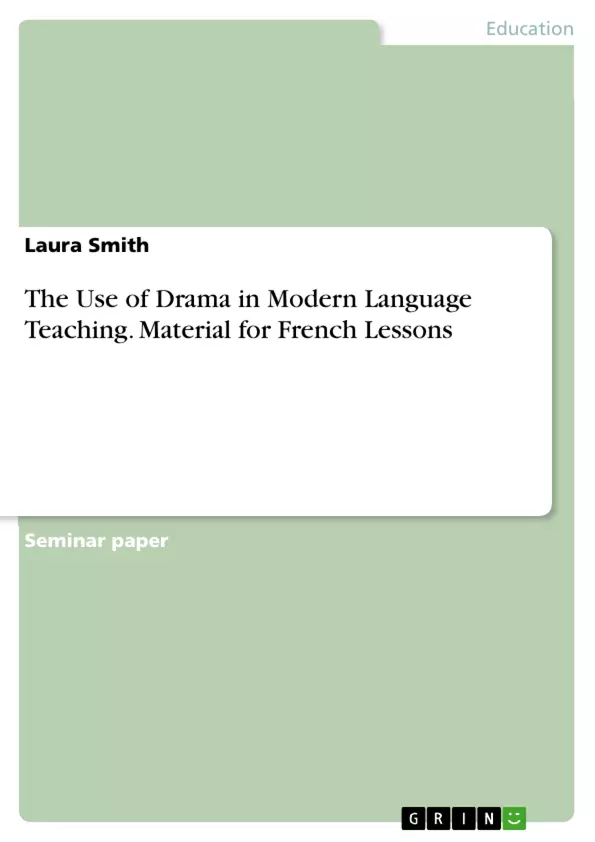Drama pedagogy is a highly promising approach to modern language teaching, which moves drama from its traditionally extra-curricular status to a key teaching and learning tool. Authentic communication is often mentioned as a goal of drama pedagogy; the teacher wants to create a context for speech that simulates actual communication rather than the isolated or contrived sentences and dialogue often found in textbooks.
This paper aims to find out what effect the use of drama can have on learners' speaking confidence, spontaneity, and fluency. Different literature on the subject is consulted and several approaches are considered, such as a speed dating activity with no preparation to simulate an authentic conversation; a role-play scripted by the pupils; and a pair conversation, with ‘character cards’ to give pupils an idea in English what they could say, and questions on the slide.
These methods are implemented over three lessons with a class of 20 year ten pupils. Different tools to collect data were used for analysis, such as a questionnaire and observation notes from the class teacher, to answer the question, in how far the use of drama can be profitable in modern language teaching.
The paper includes the used working material for French lessons and an evaluation.
Inhaltsverzeichnis (Table of Contents)
- Literature Review
- Research Design
- Data Analysis
- Conclusion
- Reference List
- List of Appendices
Zielsetzung und Themenschwerpunkte (Objectives and Key Themes)
This research aims to examine the impact of using drama in modern language (ML) teaching on learners' speaking confidence, spontaneity, and fluency, three key areas outlined in the National Curriculum for Key Stage Three. The study draws on a range of literature and employs various strategies in a practical classroom setting to explore these effects.
- The role of drama in improving speaking skills in modern language education.
- The influence of drama on learners' speaking confidence, spontaneity, and fluency.
- The importance of authentic communication and its impact on motivation in language learning.
- The effectiveness of various drama-based activities in fostering language acquisition and speaking proficiency.
- The contribution of drama pedagogy to promoting intrinsic motivation and learner engagement.
Zusammenfassung der Kapitel (Chapter Summaries)
- Literature Review: This section explores the evolution of modern language teaching methods, focusing on the importance of speaking as a key skill. It examines the challenges associated with fostering speaking confidence, spontaneity, and fluency in learners and highlights the potential benefits of using drama pedagogy in the ML classroom. The chapter analyzes various research findings and theories regarding the use of drama, authentic communication, and strategic competence in language learning.
- Research Design: This chapter describes the methodology employed in the research. It outlines the research questions, the context of the study, the participants involved, and the chosen data collection tools, including questionnaires and classroom observations.
- Data Analysis: This section presents the analysis of the data gathered through questionnaires and observations. It examines the findings in relation to the research questions and identifies any significant patterns or trends observed in the data.
Schlüsselwörter (Keywords)
This research delves into the impact of drama pedagogy on modern language teaching, specifically examining its effects on learners' speaking confidence, spontaneity, and fluency. Key themes explored include authentic communication, strategic competence, intrinsic motivation, fluency development, and the role of various drama-based activities in language acquisition. The study draws on research and practical classroom experience to contribute to the understanding of how drama can enhance speaking skills in ML education.
Frequently Asked Questions
How can drama pedagogy improve language learning?
Drama pedagogy simulates authentic communication, helping learners move beyond textbook sentences to develop confidence, spontaneity, and fluency in a foreign language.
What specific drama activities are discussed for French lessons?
The paper examines activities like speed dating to simulate authentic conversation, pupil-scripted role-plays, and pair conversations using character cards.
Does drama help with speaking confidence?
Yes, the research aims to show that drama reduces the fear of making mistakes and encourages pupils to engage more actively in speaking the target language.
What are the key goals outlined in the National Curriculum for ML?
The key areas for Key Stage Three are speaking confidence, spontaneity, and fluency, all of which can be fostered through drama methods.
Is this approach suitable for large classes?
The study was conducted with a year ten class of 20 pupils, demonstrating that drama-based methods are effective and manageable in a standard classroom setting.
- Arbeit zitieren
- Laura Smith (Autor:in), 2017, The Use of Drama in Modern Language Teaching. Material for French Lessons, München, GRIN Verlag, https://www.grin.com/document/374105



